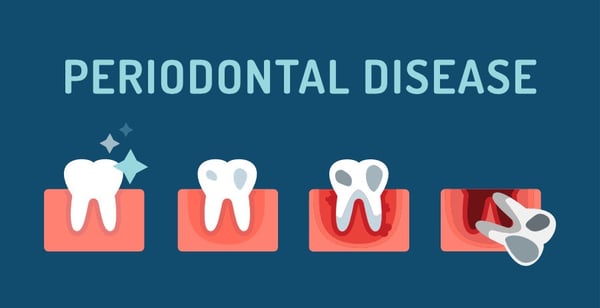
Aging is not the only plausible cause of dental loss. Dental decay, trauma or periodontal disease may lead to untimely tooth loss, and ultimately leave a dent in your confidence. While dental decay or trauma explicitly signal a medical emergency and urges you to visit your dentist, a gum disease has no noticeable symptoms and affects your oral health stealthily.
In cases where your gums are diseased, a periodontal gum treatment can successfully bring back your self-esteem and ensure a glorious smile. To shed more light on the treatment would be incomplete without learning what a periodontal gum disease is.
Understanding Periodontal (Gum) Disease
Periodontal disease is an infection that leads to inflammation of the gum and bone support around your teeth or dental implants and results in bone loss. It directly affects your gums, periodontal ligaments and alveolar bone.
Genetic predisposition is one of the causal factors apart from poor oral hygiene, and a personal risk factor diagnosis is the right path. It is also one of the most prevalent non-communicable chronic diseases, next to cardiovascular or diabetes.
Symptoms:
A study from the Centers for Disease Control and Prevention (CDC), suggest 47.2 percent, or 64.7 million American adults, have mild, or moderate, or severe periodontitis. It is imperative to notice early signs of oral diseases and consult your dentist at the earliest to avoid complications.
While most dental issues have evident symptoms like bleeding or swelling in gums, loose teeth etc., periodontal disease has no symptoms whatsoever.
Periodic dental check-ups become indispensable in such a scenario. Periodontal disease does not cause pain. Mild gum bleeding during regular tooth brushing may be the only initial visible symptom that withers away with deteriorating gum health.
Causes:
Periodontal disease can be attributed to factors more than poor oral health care. It is caused by bacteria in dental plaque that forms after you brush your teeth. It is a common bodily response to bacterial infections that result in inflammation and deterioration of the area surrounding teeth, further leading to loosening of teeth.
As stated, genetic predisposition is one contributory factor to gum disease. Over 30% of the population is susceptible to gum disease. Others risk factors include smoking and diabetes.
Having understood the symptoms and probable causes of this "silent" gum disease, let's move on to learning about its treatment in detail.
Treating Periodontal Gum Disease
While prevention entails elimination of plaque retention on teeth, regular dental check-ups and maintenance of good oral hygiene, there are a few effective periodontal diagnosis and gum treatment services that help the patients suffering from chronic inflammation, gum bleeding and loosened teeth.
Treatment of gum inflammation, bleeding and/or teeth loosening may be done surgically or non-surgically. While the latter includes bone grafting and regeneration, the former includes ground-breaking Microscope Enhanced Gum Therapy (MEGT).
Surgical Treatment:
Surgical dental treatment has been the conventional approach to bone grafting and regeneration. Administration of local anesthesia is a common practice while surgically treating this acute gum disease.
Usage of Global Surgical Microscopes for all procedures gives us an edge over traditional dental treatments. It reduces inflammatory pain-response, leads to faster healing, and substantially increases patient comfort.
However, its non-surgical alternative is an equally effective yet painless procedure.
Non-Surgical Treatment:
Microscope Enhanced Gum Therapy successfully eliminates gum infection and helps regeneration of bones in most cases. It also accomplishes safe removal of accumulation of harmful Calculus (tartar), granulation tissue and bacterial biofilm.
Our licensed and skilled periodontal therapists use specialized instruments to clean below the affected gum-line and carefully remove biofilm with an extensive utilization of ultrasonic instruments.
For more details on the diagnosis and/or treatment of periodontal diseases, contact us here



